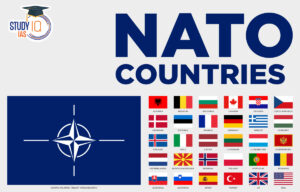Table of Contents
Introduction- Define Narco terrorism and explain the threats of narco terrorism in various dimensions.
Narco-terrorism refers to the convergence of drug trafficking and terrorism, where drug trade profits are used to fund terrorist activities.
Body
This phenomenon has emerged as a serious threat across the country for several reasons:
- Financing terrorism:Drugs fund terrorist activities in Jammu and Kashmir, Northeast, and Maoist-affected areas.
- Example- Lashkar-e-Taiba and Hizbul Mujahideen have reportedly used narcotic trade proceeds to finance their activities, particularly in border areas like Jammu & Kashmir and the Northeast.
- Cross-border Smuggling: India’s proximity to the “Golden Crescent” (Afghanistan, Pakistan, Iran) and “Golden Triangle” (Myanmar, Laos, Thailand) makes it a transit point for illicit drug trade..
- Insurgency Links: In regions like Punjab and the Northeast, insurgent groups use the drug trade to finance their operations.
- Economic instability: Illicit drug trade destabilises local economies.
- Compromised governance: Corruption and nexus between traffickers and officials.
- Social harm: Drug addiction corrupts youth, undermining national morale
- Example- Some districts in Punjab have become cancer capital due to drug addiction.
- Global Networks: Indian drug syndicates are increasingly linked with global organised crime, making it harder to combat.
- Example- The Dawood Ibrahim-Khalsa Mujahideen Nexus.
Measures required to Counter Narco-Terrorism
- Strengthening Border Control:
- Deploy advanced surveillance and technology like drones and sensors at vulnerable border points.
- Enhance coordination between Border Security Forces (BSF), Narcotics Control Bureau (NCB), and local police to combat drug smuggling across international borders.
- Tightening Legal Frameworks:
- Amend existing laws like the Narcotic Drugs and Psychotropic Substances (NDPS) Act to make penalties for drug trafficking and narco-terrorism more stringent.
- Implement fast-track courts for quick adjudication of drug-related crimes.
- Improving Intelligence Coordination:
- Establish better intelligence-sharing mechanisms between agencies like the NIA, RAW, and state police forces to disrupt narco-terrorism networks.
- Create specialised task forces to track narco-financing of terrorist organisations.
- International Cooperation:
- Strengthen cooperation with countries like Afghanistan, Myanmar, and Pakistan under international frameworks like the UN Office on Drugs and Crime (UNODC) to curb cross-border trafficking.
- Engage in intelligence-sharing with global agencies like Interpol and regional forums like the SAARC to dismantle international drug syndicates.
- Addressing Drug Demand:
- Launch nationwide de-addiction and rehabilitation programs to reduce drug consumption, particularly among youth.
- Raise public awareness through media campaigns about the dangers of drug addiction and its links to terrorism.
- Strengthening Financial Oversight:
- Track and freeze financial flows related to drug trafficking through strong enforcement of anti-money laundering laws.
- Ensure that the Financial Intelligence Unit (FIU) monitors suspicious transactions that could be linked to narco-terrorism.
- Rehabilitation and Social Programs:
- Invest in rehabilitation programs for drug addicts to reduce the demand side of the drug trade.
- Implement job-creation and education initiatives in drug-affected areas to prevent vulnerable populations from being drawn into trafficking.
Measures taken by India
- National Investigation Agency (NIA) investigations
- Enforcement Directorate (ED) actions against D-Company’s financial networks
- International cooperation with agencies like DEA (USA) and Interpol
- The Ministry for Home Affairs launched a toll-free helpline called MANAS (Madak Padarth Nishedh Asuchna Kendra).
- Narcotics Drugs and Psychotropic Substances (NDPS) Act (1985).
- The Prevention of Illicit Traffic in Narcotic Drugs and Psychotropic Substances Act (1988).
- Anti-Narcotics Task Force in each state/UT.
Conclusion
Narco-terrorism poses a dual threat of fueling terrorism while destabilising societies with the rise in drug addiction and crime. A comprehensive approach combining stringent law enforcement, international cooperation, demand-side management, and community-based solutions is essential to effectively counter the growing menace of narco-terrorism in India


 UPSC CMS Admit Card 2025 Out: Download L...
UPSC CMS Admit Card 2025 Out: Download L...
 UPSC Study Material for Prelims & Ma...
UPSC Study Material for Prelims & Ma...
 NATO Countries List 2025, Members, Funct...
NATO Countries List 2025, Members, Funct...





















